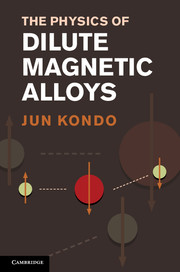Translators' foreword
Published online by Cambridge University Press: 05 March 2013
Summary
This present volume is a translation of “kinzoku denshi-ron – jisei-gokin wo chushin to shite” (“Theory of electrons in metals – with emphasis on magnetic alloys”), written by Professor J. Kondo in Japanese and published by Shokabo in 1983. The translation contains an additional chapter which discusses some of the developments that have taken place since the original publication of the book. The title of the book could very well have been “The Kondo effect”, had the author not been Professor Kondo himself. The discussion of the Kondo effect takes the prime position in this book, though the author never refers to it as such!
The author and his theory need no introduction. Suffice it to say that his work has been a milestone in condensed matter physics, with far-reaching consequences such as those in the study of many-body problems in general. But not only that. The Kondo effect also marked the beginning of the concept of asymptotic freedom, where the relevant coupling strength increases logarithmically with decreasing energy/temperature scale. This phenomenon is of central importance in the physics of strong interaction, in particle and nuclear physics, which is now believed to be described by quantum chromo-dynamics (QCD). We should add that there has been renewed interest in the study of the Kondo effect in the context of heavy electron systems and quantum dots.
Professor Kondo's famous work was carried out in the 1960s, in what has now become a central block of the National Institute of Advanced Industrial Science and Technology (AIST) in Tsukuba, Japan, and was then called the Electro-technical Laboratory or ETL and situated in Tanashi, Japan.
- Type
- Chapter
- Information
- The Physics of Dilute Magnetic Alloys , pp. xi - xiiPublisher: Cambridge University PressPrint publication year: 2012



